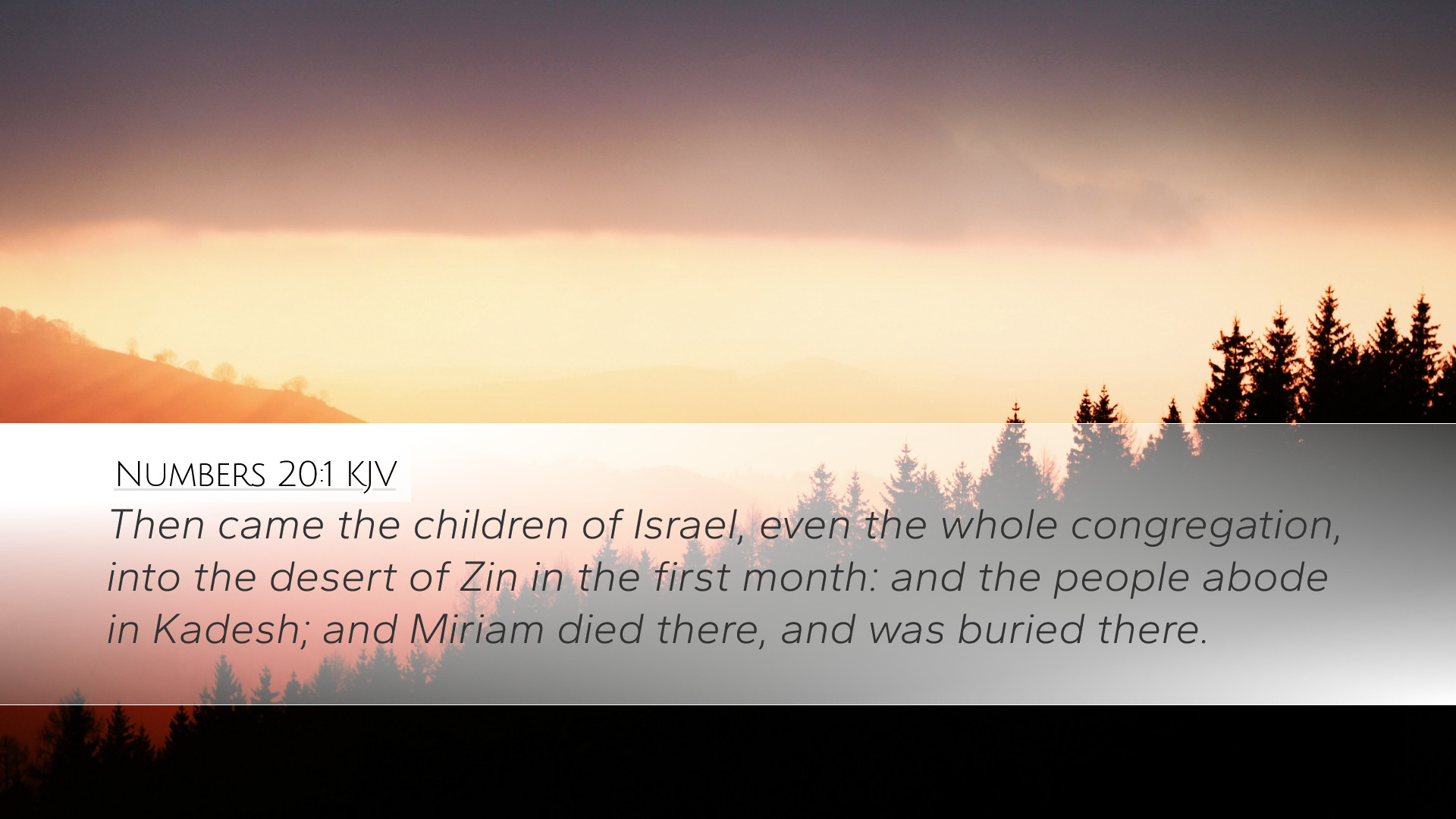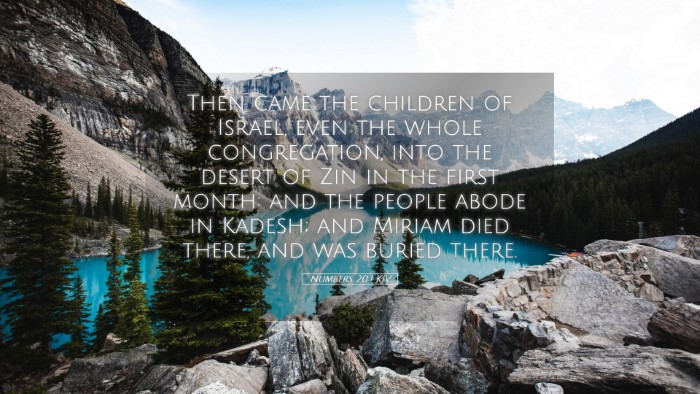Commentary on Numbers 20:1
Numbers 20:1 states, "Then came the children of Israel, even the whole congregation, into the desert of Zin in the first month: and the people abode in Kadesh; and Miriam died there, and was buried there." This verse marks a significant moment in the life of the Israelites as they journey through the wilderness under God's guidance. Below is a combined commentary from public domain sources that explores its theological and practical implications.
Contextual Overview
The chapter begins with the Israelites arriving at Kadesh, which holds historical significance as it was not only the location of previous rebellions but also as a site of God’s provision. Kadesh is considered a point of transition, leading the Israelites from rebellion toward another phase of their wilderness experience.
Insights from Commentators
Matthew Henry
Matthew Henry emphasizes the death of Miriam, noting her important role as a leader and prophetess in Israel. He highlights that her death signifies the loss of a generational figure who had witnessed the mighty works of God. Her absence could represent a transitional moment for this new generation, indicating a need for them to step into a deeper faith without the familiar leadership of their forebears. Additionally, Henry discusses the emotional impact of loss within the community, pointing out that mourning is a natural part of the human experience, especially when faced with significant losses during challenging times.
Albert Barnes
Albert Barnes places special attention on the geographical and spiritual implications of the desert of Zin. He points out that this desert represents a place of barrenness, which serves as a backdrop for Israel's hardships and failures. The mention of "the whole congregation" signifies the collective nature of their journey, particularly the shared experiences of hardship, loss, and the need for unity. Barnes notes that the congregation's arrival at Kadesh signifies a time of introspection needed after Miriam's death, urging the Israelites to reassess their relationship with God and consider their future actions in light of their past missteps.
Adam Clarke
Adam Clarke elaborates on the significance of the timing mentioned—"in the first month." This detail is crucial as it aligns with the Hebrew calendar, indicating a period of renewal and reflection. Clarke emphasizes the ritualistic aspects of mourning, which would have been prominent in their culture, allowing them to process grief collectively. He also points out the importance of memorializing significant figures like Miriam, suggesting that remembrance can be both a comfort and a call to continuity in faith among the living. Clarke interprets the burial of Miriam as an act that holds both physical and spiritual weight, reinforcing the Israelites' memorial culture, where the memory of significant leaders serves to guide future generations.
Theological Implications
This passage highlights several theological themes that are critical for reflection:
- The Sovereignty of God: The deaths of significant figures like Miriam remind the faithful that God is always in control of the narrative of His people.
- The Importance of Community: The mention of "the whole congregation" underscores the collective experience of suffering and joy in the journey of faith.
- Preparation for New Leadership: Transition periods, often marked by loss, are critical for new leaders to emerge and for communities to re-evaluate who God is calling them to be.
Practical Applications
For modern-day pastors, students, and theologians, reflecting on Numbers 20:1 provides several practical lessons:
- Mourning Together: Communities are encouraged to embrace mourning as a collective experience, creating space to grieve together when faced with loss.
- Embracing Change: Just as the Israelites had to navigate the new landscape of their journey without Miriam, contemporary believers must also adapt to change, trusting in God’s guidance.
- Remembering Leaders: Honoring those who have gone before can inspire faithfulness in those who remain, ensuring that the legacy of faith is carried forward.
Conclusion
Numbers 20:1 not only recounts a historical moment but invites readers to reflect on loss, community, and faith’s continuity in the face of change. The insights from various commentators like Henry, Barnes, and Clarke bring depth to this verse, reminding us of the importance of interpreting scripture through the lens of both history and application. The loss of Miriam calls the community of Israel—and indeed us today—to consider how to navigate the wilderness of our own lives, relying on God’s enduring presence and guidance.


